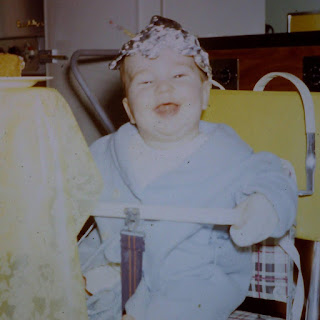Sometimes, choicers really, really reach to push their policy ideas.
There is a now-classic formula used by reformsters and choicers:
1) Define a problem, including the consequences.
3) Propose your solution.
Yeah, it just skips Step 2, which is the part where you build a connection between the problem and your proposed solution.
I don't think I've ever seen someone work this rhetorical stretchy bridge harder than the Heritage Foundation in a new report released Monday.
 |
| I'm here for the vouchers |
The title of the report will tell you where we're going: "Education Freedom and Work Opportunities as Catalysts for Increasing the Birth Rate Among Married Couples." It took three authors to concoct this.
Lindsey Burke, Heritage's education person, who is a fellow at EdChoice (Milton Friedman's foundation) and helped lead education for Glenn Youngkin's transition.
Rachel Greszler, who does jobs and labor and budget and entitlements for Heritage.
W. Bradley Wilcox, a sociologist and director od the National Marriage Project, and who has previously expressed concerns about declining fertility and marriage rates.
So let's see how they put this together.
We are short some babies!
Fertility rates are down in the US; the two contributing factors are decline in marriage and increase in women's educational attainment (according to a paper from the
Institute for Family Studies--a
conservative think tank founded by Wilcox and "dedicated to strengthening family marriage and family life"). We've got some correlation-causation issues here, but basically married women are more likely to have babies, less likely to have an abortion, Bachelor degree correlates with less baby-making, and bachelor degrees among women are up.
And so we reach this conclusion (what we can call, stretchy bridge number 1):
The fact that fertility rates fall as women’s education and incomes rise suggests that opportunity costs—not a lack of income—is driving fertility declines, and that improved options for combining family and careers would increase family formation and raise the fertility rate.
Does it? Are we to believe that poorer, less educated women are looking at pregnancy and saying, "Yeah, no opportunity costs here. I can squeeze a baby into my life without giving anything up." I could build some bridges with this "data" too, like being wealthy enough to have easy access to contraceptives and health care makes it easier to decide when to get pregnant (and not abort). I might deduce that "combining family and career" might involve supports for new parents, like paid parental leave or affordable and convenient child care, whether you have a "career" or not. I might argue that this points straight toward Medicare For All, or raising the minimum wage, or extending the child subsidies from the pandemic. And I would say that readily available birth control lowers that abortion number, but that's not really their goal here, exactly.
I'm not going to try to argue a particular conclusion for this batch of data. I'm just going to point out that the path leads to a hundred possible doors, and Heritage is going to confidently declare, "It's definitely that one door right there."
Their solution?
Multipronged. And remarkably, it turns out the best solution to our baby shortage consists of policy ideas that were already on the Heritage wish list. What an incredible coincidence!
So what are these solutions, these ideas that will lead to more baby-making?
Flexible work options
Yes, folks would like more flexible ways to balance work and life. Citing techbro neolib group
Economic Innovation Group, Heritage says that remote work increased "family formation and fertility rates." Workers with "access to" paid family leave went up 67% (so, we went from three hundred workers with paid family leave up to 500).
But the big idea here-- the gig economy! Freelancing! Gig work! Self-employment! Be your own boss! Heritage cites
this study by Freshbooks, which looked only at self- employed women working full time independently, to say that self-employed women are happier and have better work-life balance. But the survey (which has some other issues, but we don't have all day) is clearly looking at female entrepreneurs and business owners--not gig workers driving Ubers and Dashing for doors. Much as Heritage loves the idea of a gig worker economy, I don't see a lot of couples saying, "Well, we've got no steady reliable income stream, and no health insurance. Seems like the perfect time to have a kid."
Supporting Parents’ Preferences in Early Childhood Education and Care.
Access to childcare that meets parents’ preferences and needs can increase the chances that would-be parents choose life over abortion and can help to enable couples to have the number of children they desire.
What parents really want, they say, is home based child care. I thought I'd end up agreeing with them in this section, but they can't quite bring themselves to say "So there should be federal laws mandating paid parental leave" or "Let's get those pandemic child care subsidies back." But no. They want more of that flexible work stuff, and also, less regulation of in-home child care providers.
Education Choice for All Families
Married couples may also delay having children over concerns about the quality of elementary and secondary schools that would be available to them.
But if they knew they were going to get a voucher, then they'd get busy popping out babies. Education Savings Accounts. That's the ticket.
There's a list of the various alleged benefits of school choice, all tied to footnotes that cite the usual assortment of in-house "research" from Education Next, EdChoice, Corey DeAngelis etc etc and I'm not going to chase it all down at the moment because even if it were all true, it leads us to this huge leap:
The benefits of education choice accrue to some of the most important aspects of families’ lives and could increase the marital birth rate.
In other words, there is not a shred of a connection between school choice and making more babies. I can say that anything "could increase" the marital birth rate (and why would these marvelous benefits only affect marital births).
Teaching Students the Success Sequence in School
The "success sequence" refers to the research that shows that a certain sequence (graduate high school, get a job, get married, have kids) correlates with not ending up in poverty. The evidence includes research by American Enterprise Institute and the Heritage Foundation. I think the sequence is fine. But besides the fact that I've never seen any of this research address the question, "What about all the married moms who skipped the job part," the success sequence seems to have a real chicken and egg problem-- do people who follow the sequence then become inoculated against poverty, or does poverty make it really hard to follow the sequence. Folks like the Heritag Foundation would prefer not to consider the implications of the latter because the policy implication would be to double efforts to lift people out of poverty so that they had a better shot at following the sequence.
I guess this helps because it means more babies will be born to married couples? The success sequence doesn't really talk about where divorce fits in.
Using Markets—Not Taxpayer-Forced Loan Cancellation—to Reduce Student Loan Debt
This just gets better and better. If we stop forgiving loans, people will have more babies. But wait--
One can sympathize with borrowers who were given the impression by guidance counselors, the elite media, and government actors that their only way to climb the ladder of upward economic mobility was by attending a brick-and-mortar college to obtain a bachelor’s degree and to delay marriage until they fully establish themselves in the workforce.
"Don't get married until you have a job" was exactly the advice they just said that everyone should follow!! The key here is that college thing-- you don't need that. Stop college pressure (I don't disagree) and end government subsidies of colleges and students. The report doesn't really explain why it'll be a good thing to price some people out of a college education, though they suggest that somehow requiring colleges to bear some of the cost of student loan defaults will dramatically lower the cost of higher education.
Also, somehow, forgiving loans will make middle and low income people poorer, and then they'll put off having babies.
Lower-Cost, More Effective Education and Workforce DevelopmentI'm not sure where it bubbled up from, but this push to scrap college credentials as important for the work force
is everywhere these days. Here Heritage argues that "career-based education" will more likely get jobs and good pay and that will, of course, lead to making babies.
Recommendations for State and Federal Policymakers
All of the above. Teach success sequence. De-regulate pre-K. Vouchers. More gig work and flex hours. Let workers "earn" paid family leave. Make more workers ineligible for overtime hours. Turn head start into pre-K vouchers. Turn Title I into vouchers. End federal PLUS loans. Make colleges liable for student loan costs. De-bundle college education by removing ties between accreditation and college aid. Add more vocational training.
Never mind that these are mostly bad policy ideas-- if I showed you this list, would you think, "Yeah, this would definitely get more people to get married and make babies." Heritage characterizes these as :new, commonsense approaches," but they are neither.
Public policy should support families as they form and grow and can do so through reducing government regulatory overreach, by directly funding students instead of institutions, and by removing barriers to a flexible workforce.
A bicycle, because a vest has no sleeves. This "report" is not research and it's not proof; it's just the assertion of a preference for particular policy ideas. Which is fine. That's what I do in blog posts many times a week. What I don't do is try to pretend that my blog post is a piece of real research, or package it as a "report" or "study."
This Heritage blog post is a supreme example of the template I showed at the top of this post-- ther5e is a complete lack of connection between their stated problem and their favored solutions. I could start from the same place they do and end up arguing that this is why we should have universal guaranteed income, or universal single payer health care, or a much higher minimum wage. Hell, using the same "rigor" they use in this piece, I could argue that we would get more babies if we made people eat more fiber, or took steps to eliminate free radicals.
This is what you get when someone starts from the conclusion they want to reach and then tries to go backwards to support. It's a very silly "report," not to be taken seriously. Here's hoping nobody does.







